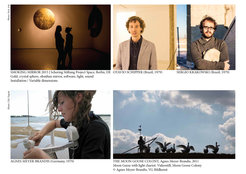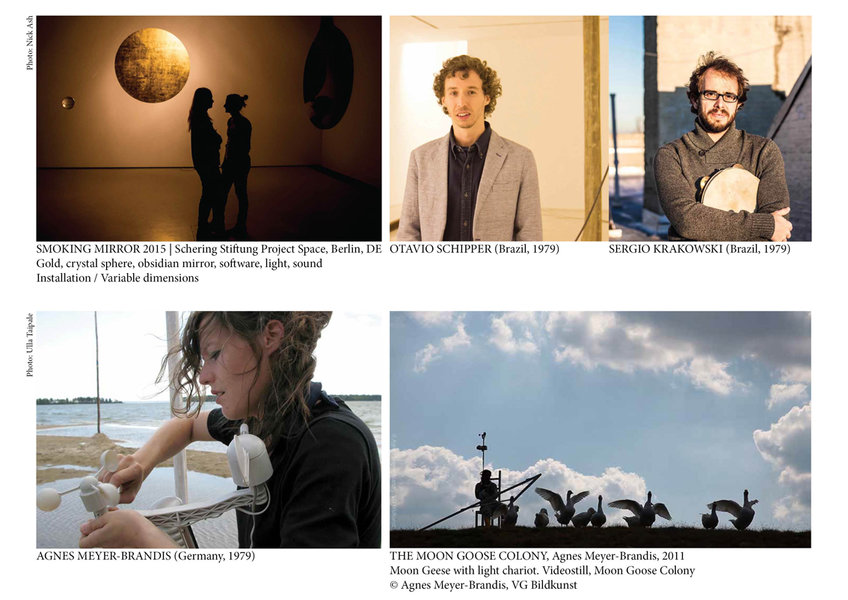Agnes Meyer-Brandis (Germany) and the duo Otavio Schipper and Sergio Krakowski (Brazil) have been selected to participate in the artist-in-residence program KLAS
Within KLAS – “Knowledge Link through Art and Science” – the Max Planck Institutes of Colloids and Interfaces and Molecular Plant Physiology invite for the first time contemporary artists to develop their own project at the Potsdam-Golm Science Park (Germany) and the University of Groningen (The Netherlands). In the course of this eight month pioneering project, artists will work side by side with researchers in order to develop a new artwork bridging contemporary art practices and scientific research.

Artists selected
After launching an open call and receiving almost 200 projects from 36 different nationalities a jury of renowned professionals from both the field of Science and Art have selected the projects submitted by Agnes Meyer-Brandis (Germany) and the duo Otavio Schipper and Sergio Krakowski (Brazil). The three of them are now invited to explore their practice within another community. The artists have a long history of working in-between art and science and have presented their projects in different centers and institutions worldwide. Their work has also been recognized internationally with a long list of awards.
Enthusiastic at the news, the artists have already offered snippets of insight in their future prospects. Meyer-Brandis is looking forward to work in an international team of SynBio experts: “I’m already thrilled to investigate how trees can walk to escape climate change. In the long run, this joint venture could create one small step for a man and one giant leap for a tree”.
Schipper and Krakowski are aiming to establish a certain kind of communication between human beings and bacteria through sound: “We strongly believe that focusing on the DNA content of both humans and bacteria can be a central source of inspiration for our work (…) This common denominator raises several poetic layers of interpretation and strongly relate to our previous artistic works founded in the concepts of information and coding”.
Such interdisciplinary encounters are particularly powerful to bridge the gap between disciplinary fields and provide a new look into scientific tasks and working methodologies. Trying to look beyond predefined categories and critically re-examining traditionally established disciplinary divisions, KLAS' main goal is providing an additional fresh insight into the field of Synthetic Biology, a thriving field at the interface between physics, chemistry, molecular cell biology and engineering.
Synthetic Biology (SynBio)
SynBio dissects the architecture of the living cell into different modules and reconstructs these modules using natural as well as synthetic building blocks. On the one hand, this reconstruction improves our understanding of „what is life”, on the other hand, the integration of synthetic components enables us to obtain modules with new functionalities. Because of these methodologies, SynBio seems a perfect framework for artists to become inspired and to develop their own speculative interpretation of the discipline's procedures and modes of operation. Inspired by their experience in the laboratory, artists will in turn offer original points of view and operational perspectives that, hopefully, will ultimately serve to inspire the hosting scientific teams in their own work and investigations.
KLAS “Knowledge Link through Art and Science”
Knowledge Link through Art and Science (KLAS) is an Artist-in-Residence program of the Max Planck Society. KLAS fosters ArtSci exchange and transdisciplinary innovation and education whilst also establishing a link between Synthetic Biology research groups of two research institutions - Rijksuniversiteit Groningen [RuG] and two Max Planck Institutes [MPIKG & MPIMP]. In addition to awarding two Artist Residencies in 2017, KLAS will present a series of events and conversations around specific thematic topics. KLAS is funded by the Max Planck Society and the Schering Foundation and organized by Polyhedra.
The four research groups hosting this interactions are:
Dr. Arren Bar-Even (Systems and Synthetic Metabolism, MPIMP)
Dr. Tom Robinson (Biomicrofluidic Systems, MPIKG)
Prof. Jan Kok (Molecular Genetics, GBB)
Dr. Alex de Vries (Molecular Dynamics, GBB)
